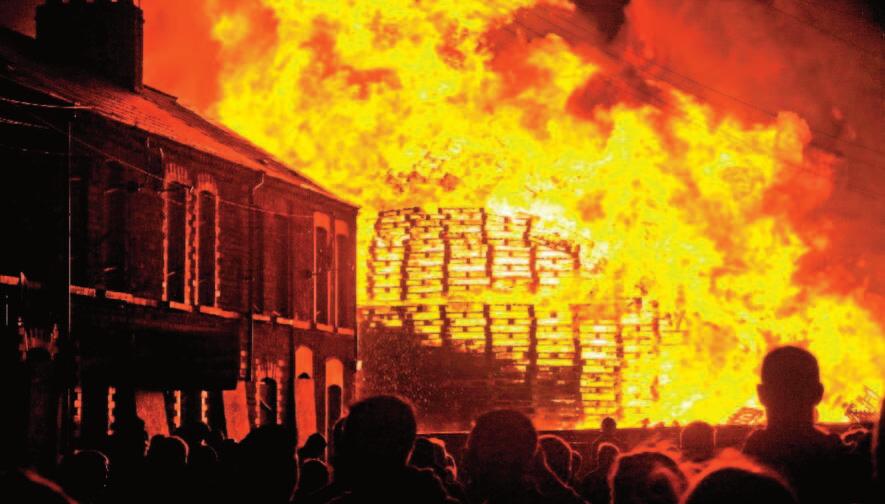
2 minute read
Rising temperature on bonfire debate
THIS YEAR, once again, the issue of bonfires was a subject of controversy in the North. For many working class Protestants, Eleventh Night bonfires are part of their culture with tens of thousands attending them across NI, while many Catholics see them as triumphalist displays of sectarianism. In addition to bonfires on the Eleventh Night there are the less prominent anti-internment bonfires organised in some nationalist areas.
Genuine Fears
On some Eleventh Night bonfires the Irish tricolour and effigies of nationalist politicians have been burned, along with sectarian and racist slogans being displayed. Similarly, anti-internment bonfires in Catholic areas have often displayed Union Flags and sectarian slogans. This has rightfully been widely condemned by working-class people on both sides of the community.
There are also genuine health and safety concerns for nearby residents. Often nearby houses can suffer damage from the heat. Last year a man tragically died after falling off a 50ft bonfire in Larne, and a young person suffered severe burns. There can also be instances of violence and antisocial behaviour, with 11 paramedics being attacked this year.
It is important to note that blatant sectarianism is not on display at all bonfires, and this year more bonfires avoided burning flags than in previous years. Also, most bonfire organisers do take health and safety concerns into consideration and they take place at a considerable distance from residential property. For many Protestants, the Eleventh Night bonfires are an important expression of their culture and identity and are primarily a way for the community to come together. It is no way useful to simply dismiss bonfires as driven by bigotry.
Sectarian politicians antagonise the situation
This line of argument has been used in the past to justify the call for bonfire sites to be cleared, necessarily requiring the presence of police. For example a motion to this end was passed by Belfast City Council in 2017, supported by Sinn Féin, SDLP, People Before Profit and Alliance councillors.
Police being used to remove bonfire materials and enforce bans will only serve to antagonise the situation. This was graphically demonstrated by the rioting in Catholic areas in response to attempts to remove bonfire material in 2020. While there are legitimate concerns about bonfires, the Socialist Party is opposed to draconian attempts to ban them and respects the right of communities to hold such events.
Any genuine solution must come from the working class communities affected, not be imposed from outside. For example in the Bogside this year the anti-internment bonfire was called off following discussions within the community.
A genuine coming together of people within these communities, free of paramilitary interference, can determine democratically how they are organised in a manner which minimises damage to property and the environment, as well as ensure there are no sectarian or racist provocations. The fact that, nearly twenty years after the Good Friday Agreement, issues like bonfires, parades, flags and legacy issues are nowhere near resolved is a testament to the fundamental contradiction of the ‘peace process’ – that sectarian politicians have no interest and even less capability in overcoming the divisions in our society.
It is no wonder that the bonfires most steeped in controversy are those in the most deprived areas, where a generation of young people feel left behind by politicians who have oversaw years of austerity and deprivation. There is a need for a mass, anti-sectarian party to unite working class people in the fight for a future free from poverty, conflict and division. Such a movement could lay the basis for genuine solutions to contentious questions by bringing people together in a spirit of solidarity, compromise and mutual respect







